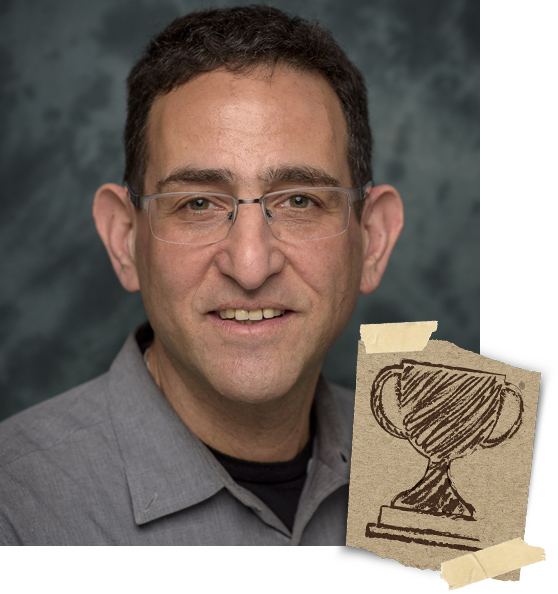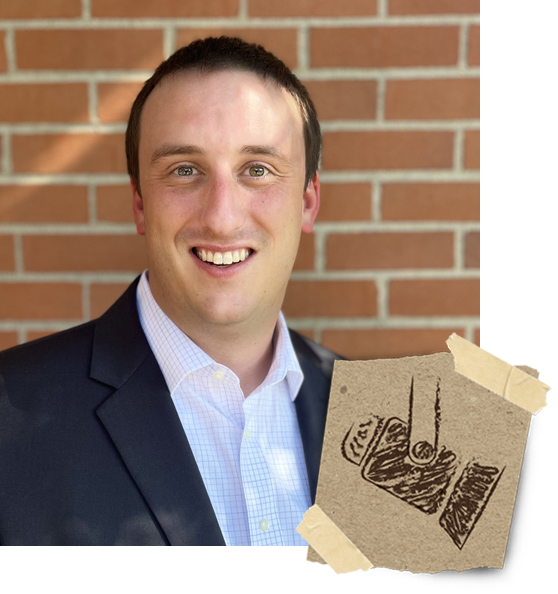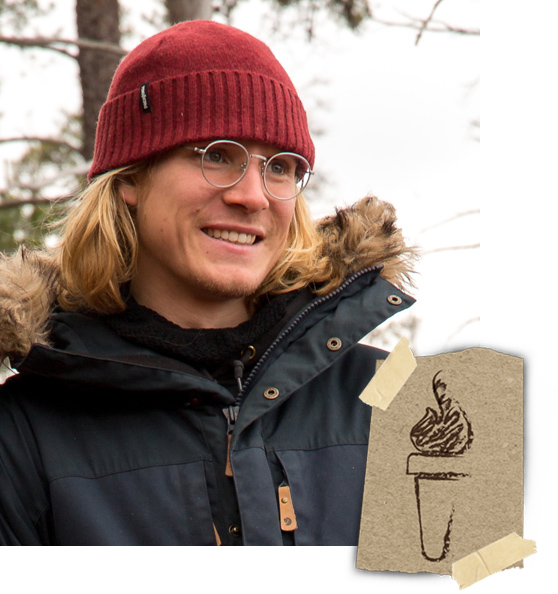Diversity Champion: Dr. Ronen Steinberg
January 22, 2024 - Emily Jodway
 Dr. Ronen Steinberg is an associate professor in the Department of History in the College of Social Science. Each day he educates and empowers his students to examine historical events through a social scientist’s perspective. One of the main courses he teaches is on the History and Theory of Genocide, a topic which stands at the forefront of many individual’s minds around Holocaust Remembrance Day. During Holocaust Remembrance, Dr. Ronen Steinberg discussed his course on human rights atrocities, but more than that, he reflected on the ways that we can triumph through even the worst of circumstances.
Dr. Ronen Steinberg is an associate professor in the Department of History in the College of Social Science. Each day he educates and empowers his students to examine historical events through a social scientist’s perspective. One of the main courses he teaches is on the History and Theory of Genocide, a topic which stands at the forefront of many individual’s minds around Holocaust Remembrance Day. During Holocaust Remembrance, Dr. Ronen Steinberg discussed his course on human rights atrocities, but more than that, he reflected on the ways that we can triumph through even the worst of circumstances.
Born and raised in Israel, Steinberg left for the first time at age 31 to begin his studies in America. He received his PhD in History from the University of Chicago, where he centered his research around these topics of mass violence, transitional justice and war crimes. Some of these ideas and theories were ones he had never heard of before, and discussions of how societies move on after violent events come to an end especially peaked his interest.
Dr. Steinberg conveys through his teaching his immense knowledge of the history of genocide around the world and is passionate about transitional justice, or the ways that a society responds to serious human rights violations in order to prevent future incidences of mass violence and abuse. He navigates his students through the difficult task of defining what genocide is, as well as how and why it happens, by looking at a variety of cases from history. He utilizes many different lenses to view these histories.
“The course is very interdisciplinary,” he explained. “We look at things from history, psychology, sociology, even quantitative stuff like charts. This gives students different ways of thinking about violence and it encourages them to figure out how broad theoretical approaches function when you apply them to concrete historical cases.”
His course also challenges students to draw on empirical data and real-life cases to explain why and how genocide occurs. One such example is the Milgram Experiment, which simulated electric shocks to individuals who were told by authority figures to shock their experiment partners, which showcased how far someone would go to follow orders just because they were coming from someone ‘in charge.’ Students apply this theory to the trial of Adolf Eichmann, a prominent Nazi Party member who was tried in court for his involvement with the Holocaust.
“Eichmann argued that all he was doing was following orders, and many people were outraged by this. But social psychologists thought, maybe he is telling the truth,” Steinberg said. “And maybe that’s exactly what we need to study. How does an ordinary person that has a family and children become involved in this kind of criminal activity? These cases are controversial but fundamental to our understanding of how ordinary people become involved in extraordinary evil.”
When Steinberg first designed the course, he wondered if he could teach on genocide without even having to cover the Holocaust. But it quickly became clear to him that the tragedy is fundamental to the entire field of genocidal studies, even if it can be a difficult topic to discuss.
“I come from Israel and the Holocaust has been part of my memory and part of my life since I can remember. So I thought, I’ve had enough,” he explained. “But there is no way around it. If you want to talk about genocide in a scholarly and responsible way, you have to contend with the shadow of the Third Reich and the Nazi regime.”
His approach to this area consists greatly of firsthand accounts from victims and relatives who experienced the horrors of World War II. One example is Survival in Auschwitz by Primo Levy, a memoir by the aforementioned man who survived the death camp; given his experience as a scientist, he was spared by Nazi officers and hired to work in the lab at the camp. His book discusses Auschwitz itself through a scientific lens and presents it as one big case study in dehumanization. Steinberg explains that this again aids in their interdisciplinary approach and adds a “visceral and personal” layer to his teachings.
One of the most important aspects of Holocaust Remembrance Day, Steinberg explains, is the fact that it gave voice to an entire generation of victims of tragedy who had not yet been acknowledged. The concept of a memorial day for the Holocaust was not thought of until many years after WWII, during the ensuing trials. This was in part because when survivors first returned, their stories were seen as outlandish and many of their peers didn’t believe them.
“These people were telling their stories about what they’d been through, and people thought they were out of their minds,” he said. “The Eichmann trial [in 1961] brought in survivors to testify, and there were TV cameras; so for the first time, they spoke and everybody had to listen.”
“We would certainly do well as individuals, certainly students, to reflect from time to time on the atrocities of the past,” Steinberg said of Holocaust Remembrance Day. “There’s much to learn about human beings and the terrible things we do to one another, but more than that, we need to see how people cope with these things. Because we do cope. People cope in the face of the most horrible, unimaginable things we can conjure. They make lives, they make art, they find joy, during and even in the aftermath of catastrophe. The more I learn about genocide, the more I am actually optimistic about our species and its resilience in the face of these tragedies.”
Read more:

Diversity Spotlight
Alumni
RABBI SIMON STRATFORD
Simon Stratford graduated from the College of Social Science with a degree in social work and completed a minor in Jewish studies. Having completed rabbinical school and being ordained in 2017, Stratford currently serves as Associate Rabbi and Director of Lifelong Learning at Temple Sholom of Cincinnati.

Diversity Torch
Student
JACOB STARNER
Jacob Starner is a senior at MSU studying Economics with a minor in Jewish studies through The Michael and Elain Sterling Institute for Jewish Studies and Modern Israel. He is heavily involved in the on-campus Jewish community, participating in activities with the Jewish Learning Center and MSU Hillel.

Diversity Matters
We strive to cultivate an inclusive and welcoming college environment that celebrates a diversity of people, ideas, and perspectives.

